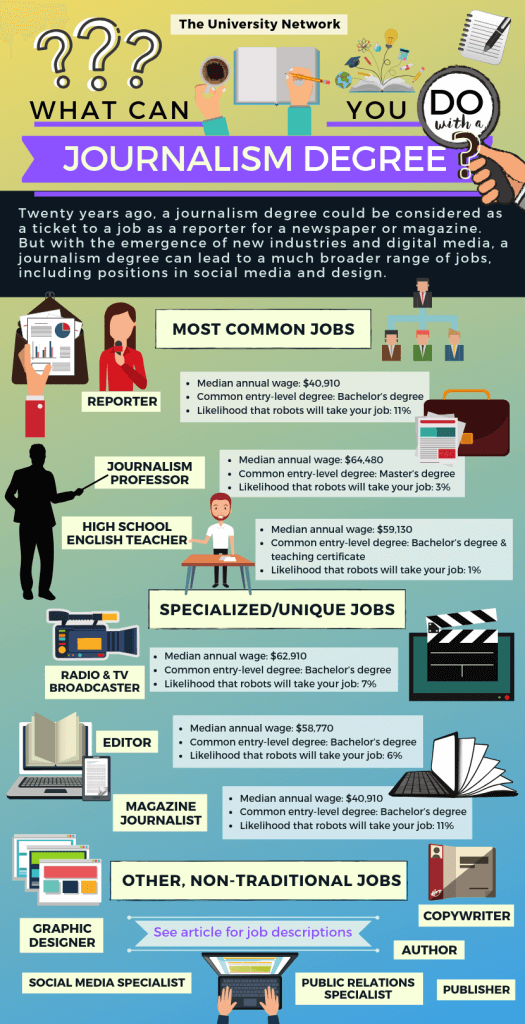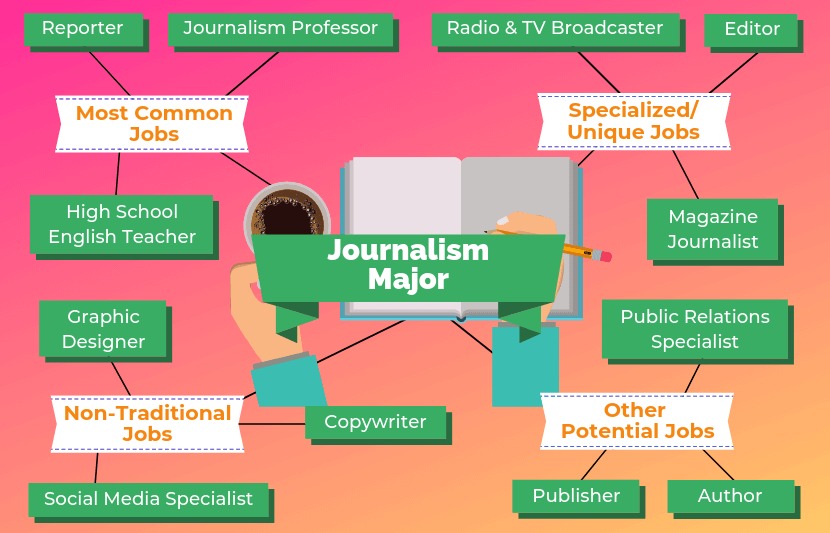Journalism majors are skilled writers, readers and communicators who are curious and excited to learn. Twenty years ago, a journalism degree could be considered as a ticket to a job as a reporter for a newspaper or magazine. But with the emergence of new industries and digital media, a journalism degree can lead to a much broader range of jobs, including positions in social media and design.
Here is a list of 12 possible jobs for journalism majors:
Most Common Jobs for Journalism Majors
1. Reporter
Technically, there is no required degree to become a reporter, but you will have a hard time finding a job without one. Skilled reporters are master storytellers with strong writing and grammar skills. Journalism programs teach students the proper style and format to draft all types of stories, from breaking news to long-form feature articles.
Median annual wage: $40,910
Common entry-level degree: Bachelor’s degree
Likelihood that robots will take your job: 11%
2. Journalism Professor
After spending years out in the field, working for newspapers, magazines and online media companies, many journalism majors head back to the university setting. Patience, communication, organization and enthusiasm are some of the most important characteristics of a good college professor. To earn a job teaching at the post-secondary level, a master’s degree (and sometimes a doctorate degree), is required. In addition to teaching, some college professors also conduct research and write scholarly articles.
Median annual wage: $64,480
Common entry-level degree: Master’s degree
Likelihood that robots will take your job: 3%
3. High School English Teacher
Journalism majors often develop the reading, writing and grammar skills necessary to teach English at the high school level. After earning a bachelor’s degree, those who aspire to teach in high schools have to complete an internship in a school classroom, pass the state-required test for teachers, and receive a teaching certificate/license.
If you are dead set on being a teacher, the best advice would be to major in education. But if you’re still uncertain about what you want to do, a degree in journalism could ultimately help you land a job teaching English. As long as your degree is in a related field to the classes you aspire to teach, you should be able to earn a job.
Median annual wage: $59,130
Common entry-level degree: Bachelor’s degree & teaching certificate
Likelihood that robots will take your job: 1%
Specialized, Unique Jobs for Journalism Majors
4. Radio & TV broadcaster
In addition to being journalistic storytellers, radio and TV broadcasters have to be fun, clever and interesting enough to attract listeners and viewers. Like many other occupations, broadcasting isn’t something you can just jump into. To get a sense of the industry, people interested in broadcasting should apply for internships. There is much more that goes into broadcasting than what the public sees on TV, or hears on the radio.
Median annual wage: $62,910
Common entry-level degree: Bachelor’s degree
Likelihood that robots will take your job: 7%
5. Editor
Nearly every magazine, newspaper, publishing house and content-producing website needs editors, so they are typically in high demand. And because there is public interest in various types of information, editors can work in all types of industries, including fashion, sports, politics, art, food and many more. Because editors often have the last look before writing is publicized, it is often a senior position. Companies like to hire editors who have prior experience either writing or editing.
Median annual wage: $58,770
Common entry-level degree: Bachelor’s degree
Likelihood that robots will take your job: 6%
6. Magazine Journalist
Like reporters, magazine journalists are master storytellers with strong writing and grammar skills. However, those who aspire to write for a magazine are generally more interested in writing long-form feature articles, which can take weeks, or even months, to complete. Some magazines still have writers on staff, but many of them have shifted towards hiring freelance writers. For a journalist, freelance writing isn’t easy, as biweekly paychecks aren’t guaranteed. However, there are some advantages. Freelance writers have an opportunity to write a wide range of stories, work on their own time, and publish their writing in many different magazines.
Median annual wage: $40,910
Common entry-level degree: Bachelor’s degree
Likelihood that robots will take your job: 11%
Non-Traditional Jobs for Journalism Majors
7. Social Media Specialist
This job may not have existed 20 years ago, but it has become one of the fastest growing careers. Many newspapers and online media companies employ social media specialists to handle all or some of their social media accounts. Social media specialists are responsible for developing their company’s social media presence, improving its online reputation, and generally growing its brand. On a day-to-day basis, they typically draft, develop and execute social media marketing strategies, create new content, and manage social media accounts. Typically, to earn a job as a social media specialist, one would pursue a bachelor’s degree in marketing or advertising. However, many universities have implemented social media certificate programs, which would equip journalism majors with the skills they need to land a job as a social media specialist.
Median annual wage: $59,300
Common entry-level degree: Bachelor’s degree
Likelihood that robots will take your job: 18%
8. Copywriter
Journalism majors possess strong writing and grammar skills that can easily translate to a wide range of jobs, including copywriting. Copywriters are the professional writers who create the text for advertising materials, such as billboards, brochures and catalogs. Copywriters may work at an agency, in-house for a company, or freelance. There is no education requirement to become a freelance copywriter, but employment in an agency or at a company will typically require a bachelor’s degree.
Median annual wage: $62,720
Common entry-level degree: Bachelor’s degree
Likelihood that robots will take your job: 4%
9. Graphic Designer
In the digital media age, many news articles have an infographic attached to them. So, it is not uncommon to find journalism grads interested in graphic design. But making the switch isn’t easy. Graphic designers need to have strong illustration skills and a proficiency in digital illustration, photo-editing and layout softwares. And to earn a job in the industry, graphic designers typically need a strong portfolio that demonstrates their ability.
Median annual wage: $48,700
Common entry-level degree: Bachelor’s degree
Likelihood that robots will take your job:8%
Other Potential Jobs for Journalism Majors
10. Author
In addition to instructing students on style and format, journalism school teaches students how to eloquently express their thoughts through their writing, thus preparing them with the skills they need to draft short stories and novels. Like any art form, writing takes time, commitment and resilience. There is no golden guide to writing a best-selling book, but that shouldn’t discourage you. If you have the passion and skillset to write, you absolutely should.
Self-publishing has grown increasingly common in the internet age. But traditionally, to have a book published, authors seek out an agent who can connect them with publishing companies that can choose to print, publish and sell a book. Typically, the publishing company will work out some contractual agreement with the author to buy the rights to a book.
Median annual wage: Varies
Common entry-level degree: Varies
Likelihood that robots will take your job: 4%
11. Public Relations Specialist
PR specialists are employed by organizations or individuals to manage their public image and communicate with the public. They often serve as the middleman between an organization and the media. On a day-to-day basis, PR specialists communicate with the media to help shape their organization’s public perception. This often involves completing a variety of tasks, which might include writing press releases, responding to media inquiries, arranging interviews, drafting speeches, or holding press conferences. A bachelor’s degree in journalism, communications or a related field is typically enough to qualify for a position as a PR specialist.
Median annual wage: $59,300
Common entry-level degree: Bachelor’s degree
Likelihood that robots will take your job: 18%
12. Publisher
Publishers make editorial and content production decisions for companies in the book, newspaper, magazine and online media industries. In contrast to editors and staff writers, publishers generally are required to think more about the big picture and steer the direction of a company. And although a bachelor’s degree is typically all that is required to earn a publishing job, most positions call for candidates with years of experience in the field.
Median annual wage: $69,534
Common entry-level degree: Bachelor’s degree
Likelihood that robots will take your job: N/A
10 Famous People Who Studied Journalism
- Sophia Bush
- Ann Curry
- Phil Knight
- Michael Moore
- Michelle Monaghan
- Olivia Munn
- Sarah Palin
- Brad Pitt
- Meg Ryan
- Denzel Washington




